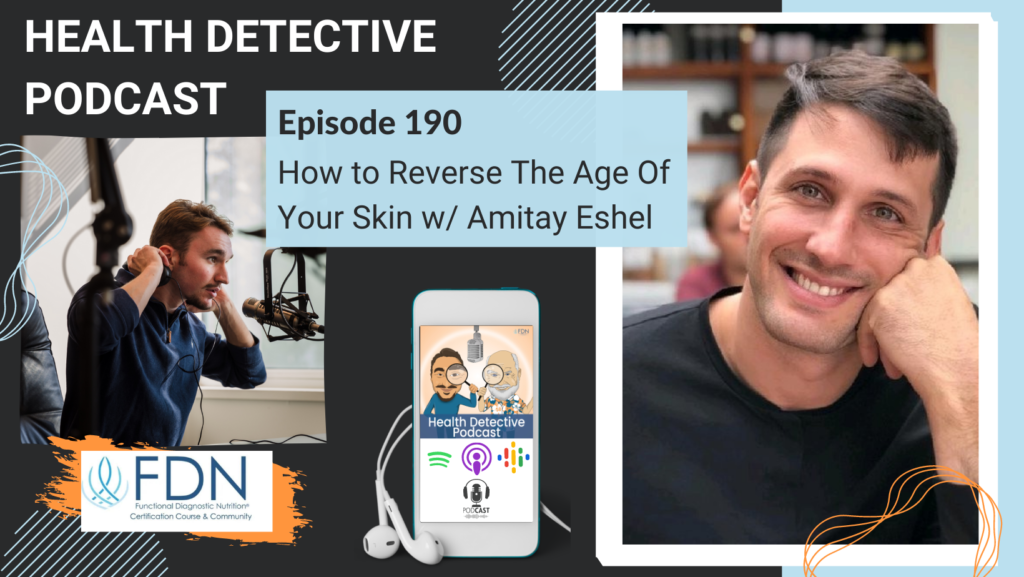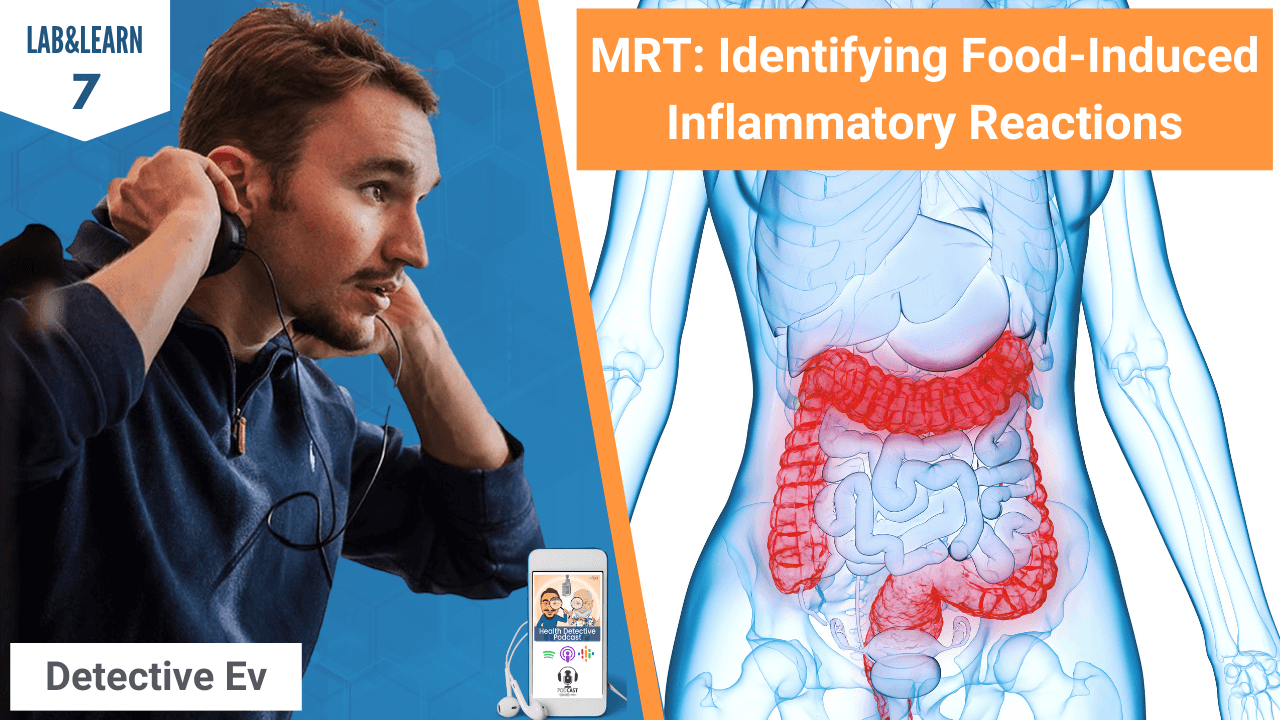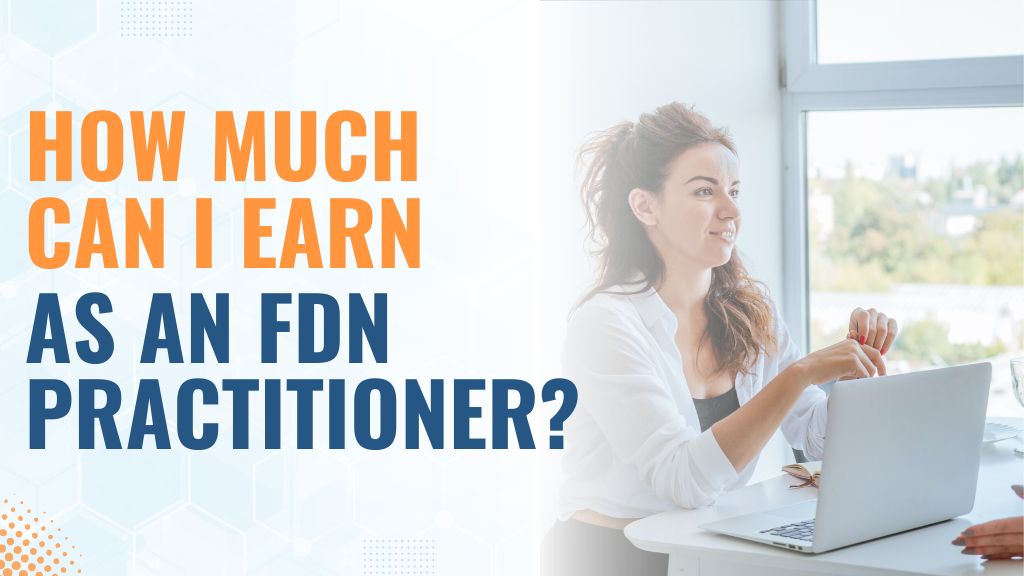Introduction
[00:00:00] Detective Ev: Well, hello my friends, and welcome back to another episode of the Health Detective Podcast by Functional Diagnostic Nutrition. My name is Evan Transue, aka Detective Ev. I will be your host for today’s show focused on your skin.
We are talking to a gentleman I’ve gotten to meet a couple of times now at these things called the Biohacking Congresses. The Biohacking Congress, if you guys don’t know, pretty fun place. We’ve been hanging out there as FDNs very often. They are a newer event. They started; I believe in 2020. Not really the best time to start an event, so I give these guys a lot of credit for what they’ve pushed through. And they are doing three or four events per year. I think it’s probably three right now.
So, they do Miami. They’ve been doing Boston. They’ve been doing Vegas. I know that we have one coming up in February of. 2023 in Austin, Texas. Which I think will be pretty fruitful for them because that’s a great place for a lot of these conferences, it seems. I can imagine that’ll be a fun one.
Definitely check them out, biohackingcongress.com. And always, of course, listen to this podcast, because when these events are coming up, we will have discounted tickets for the show. A lot of the times we have 50% off as FDNs cause we are a high-level sponsor of them. So pretty cool.

Now with that said, the gentleman that I got to talk to on this podcast, really interesting guy that took a huge career turn. I know that we have that typically, but very large career turn. You will hear that in the podcast itself.
Natural Rejuvenation Processes for Your Skin
His name is Amitay Eshel. He’s an entrepreneur in the biohacking and beauty field. He has held executive roles in the health, wellness, and beauty industry for over a decade, as well as being a business development consultant in that space.
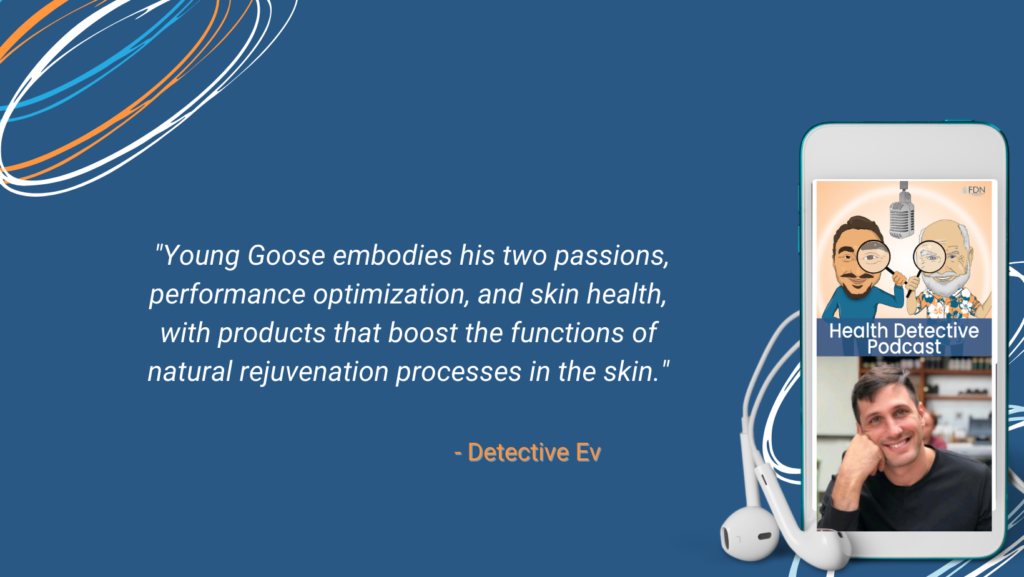
As co-founder and CEO of Young Goose, the biohacking skincare company and host of the Young Goose’s Biohacking Beauty podcast, Amitay has been making waves in his industry through education and innovation. Young Goose embodies his two passions, performance optimization, and skin health, with products that boost the functions of natural rejuvenation processes in the skin.
Really kind of cool stuff and something that if you’re a regular listener, you know I’m quite interested in. Because I’m someone who suffered with a lot of skin stuff for many, many years. I think what they’re doing is interesting, especially the way that he quote/unquote “sells this”.
He does not sell it as a magic bullet, as a magic potion or lotion that’s going to somehow cure acne or psoriasis or whatever it might be. He fully explains and is transparent that this is a great tool in the toolbox, mixed in with the other lifestyle changes that are needed to get us to optimal skin health. And this serves a very particular role. I think you guys are going to like this one. Without further ado, let’s get to today’s episode.
All right. Hello there, Amitay. Welcome to the Health Detective Podcast, my friend. Good to see you after only about a week off.
[00:02:39] Amitay Eshel: Exactly. Yeah. I asked you off air, what’s new? And you were like, well, we’ve seen each, I mean, a week ago. Yeah. I agree. Good to see you.
Hoping Health Conferences Continue Providing New Information
[00:02:49] Detective Ev: For those wondering what the heck we’re talking about, him and I had actually seen each other at the Biohacking Congress in Miami. That is a relatively, in the last couple years, newer-ish conference that, they’re pushing out a few events every single year.
Their next one is in Austin, Texas. I believe that’s like February 4th, 5th, or 6th or something like that. Don’t quote me on it. But definitely check that out if you’re in the area. I think that’ll be cool to see how that one works out for them. Because Austin is just popping, man.
We’re going to the How Do You Health? Festival. KetoCon is down there in April. Obviously, Paleo Effects used to be a pretty big thing down there. I don’t think they’re doing one in 2023. But it seems to be the place for everything health nowadays. So that could be a good one in February.
[00:03:27] Amitay Eshel: We’re going to be in How Do You Health? as well. It’s kind of a, you build it, they will come, kind of thing. I wonder if Austin’s really going to be the mecca for alternative health or whatever you want to call this, progressive health.
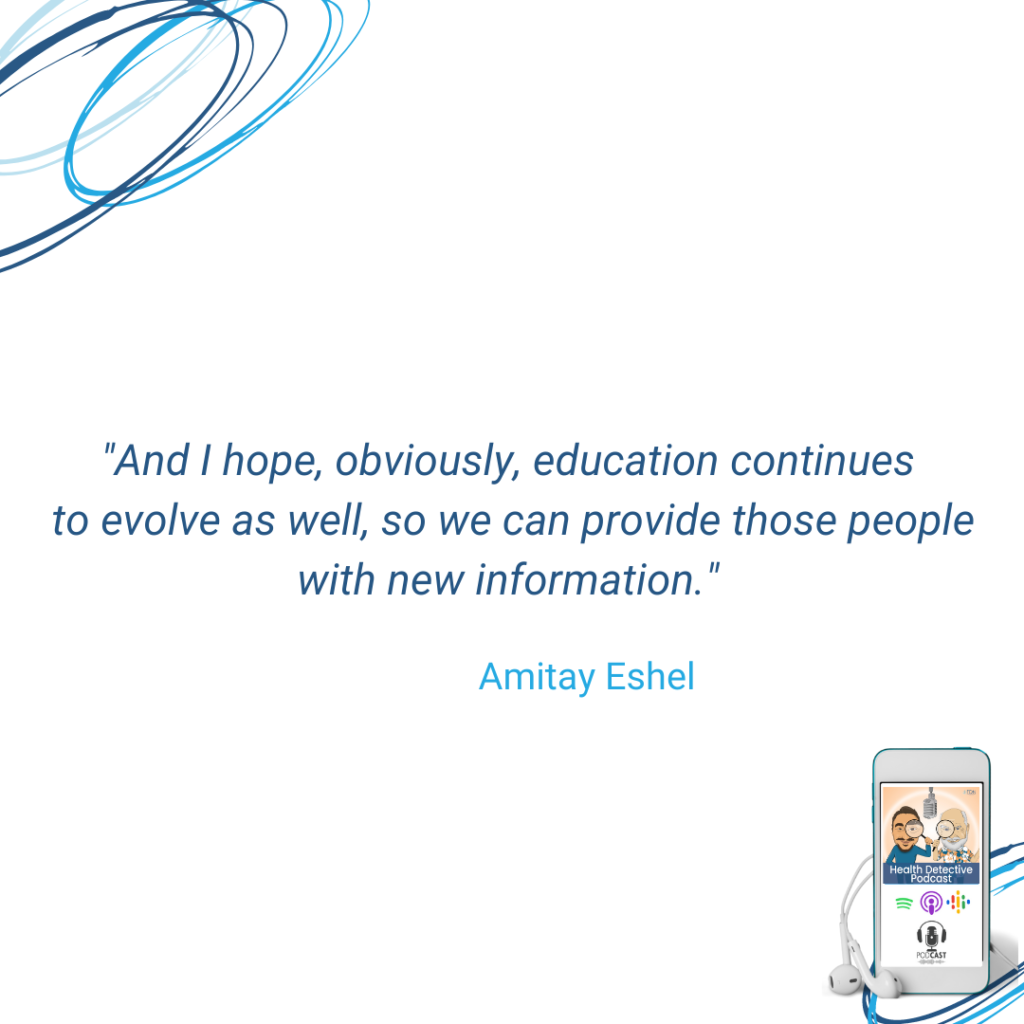
Because if it will, I think it’s going to just facilitate more and more of those meetups. How many do you think, can it contain right now? Because the problem is that because there are so many of those, it’s more like local people showing up, right? It kind of is those conferences banking on just the Austin population growing. So, I hope it’s going to continue to grow. And I hope, obviously, education continues to evolve as well, so we can provide those people with new information.
Health Conferences Done in a Healthy Way
[00:04:10] Detective Ev: Absolutely. What’s cool is, by coincidence Thursday night, I just interviewed Baldo and Nurse Doza that are two people helping out with the conference. I shouldn’t say helping out. I mean, there are two people running the conference with Aaron and stuff.
Man, I think the energy of those three combined and just the vision that they had. I mean, they said that they had something going on last year where they had 60 people jumping into a pool filled with ice all at once. I’m like, that’s where this is going, honestly. That’s what people want to do. It sounds funny, it’s not what you expect at a conference necessarily. But I think that’s kind of the future of this stuff.
And you and I were just talking before we were LIVE how there’s a bit of irony. It’s not the conference host’s fault. But when we go to these conferences sometimes, you know, we’re health professionals and you end up feeling more drained half the time than not because you’re outta your routine, you’re traveling, all this stuff.
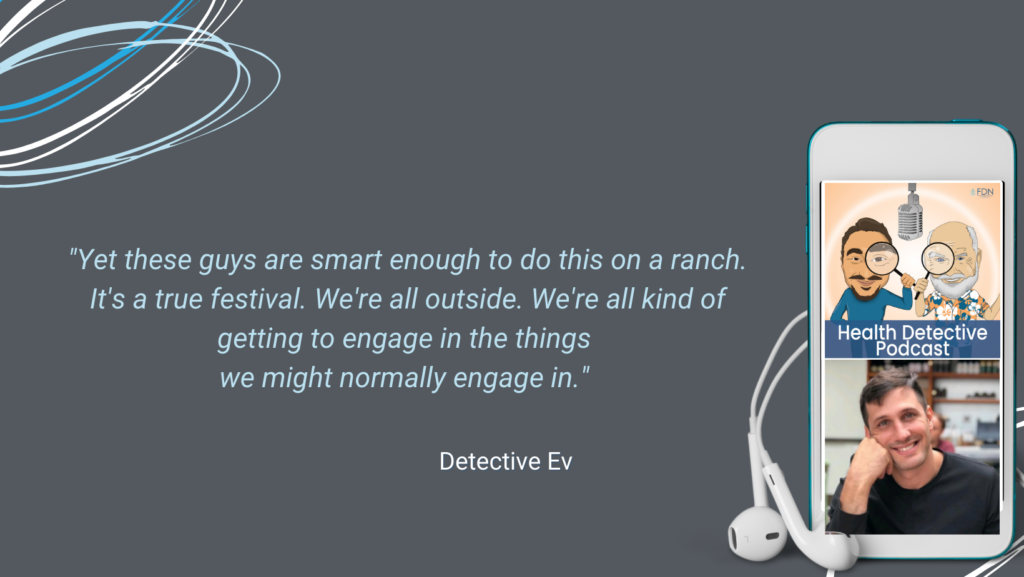
Yet these guys are smart enough to do this on a ranch. It’s a true festival. We’re all outside. We’re all kind of getting to engage in the things we might normally engage in. So, I can’t wait for this one. I’m excited.
Is it Requiring Too Many Sacrifices?
[00:05:05] Amitay Eshel: Me too. I think what they’re doing is like my dream come true, right? They have a successful business as far as like an IV/Wellness Clinic. Then they’re just feeding their curiosity. They’re like, we’re interested in all those things. How do we learn about them in a short amount of time? Let’s just have the festival around it, but keep it on the, I’d say, the experiential scale. Give it a 10 on the experiential scale, right? Making sure that we’re doing it in an authentic way.
Were you at Rad Fest?
[00:05:41] Detective Ev: No. You were telling me about that and I kind of wish we were.
[00:05:44] Amitay Eshel: That’s The Revolution Against Aging and Death. But within that revolution against aging and death, you started at 8:00 AM and you finished at 10:00 PM.
Detective Ev: Oh, geez.
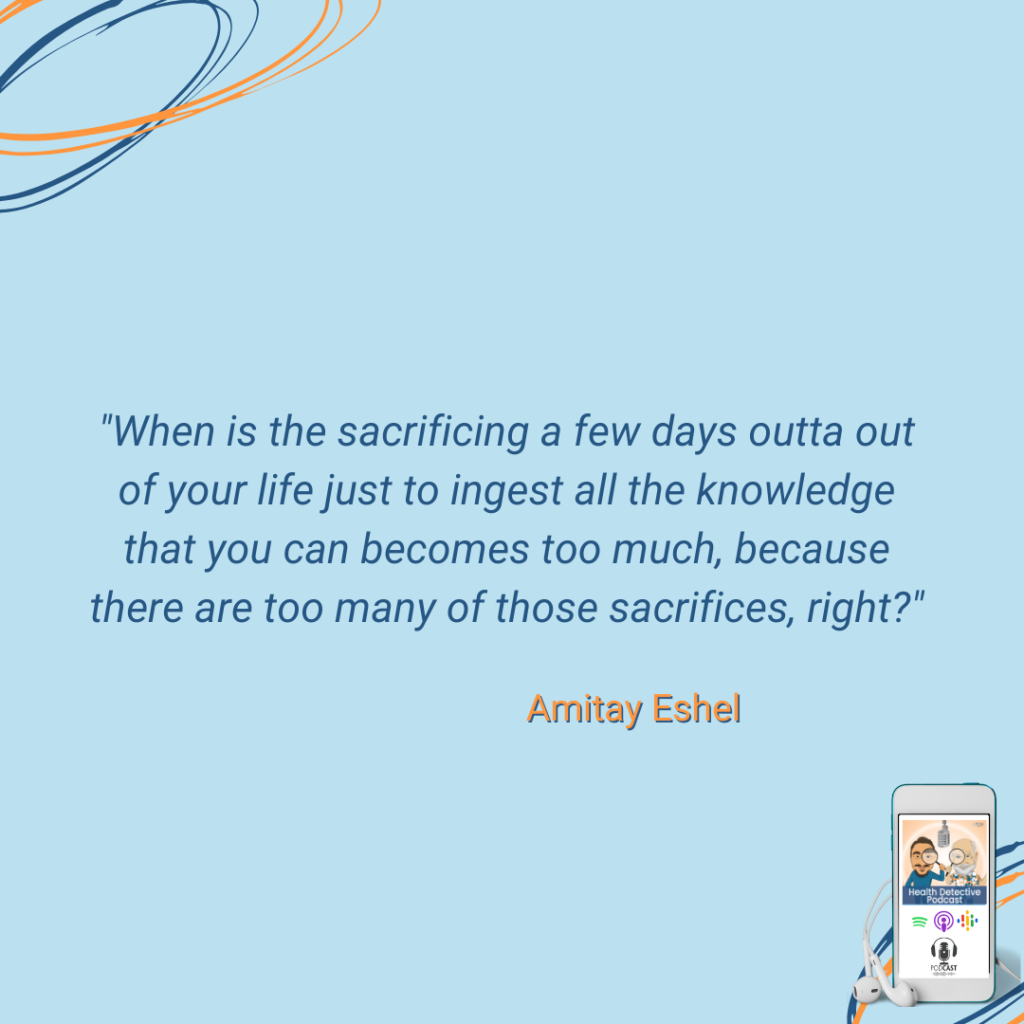
Amitay Eshel: Yeah. So that’s that. You can say it about most conferences. When is the sacrificing a few days outta out of your life just to ingest all the knowledge that you can becomes too much, because there are too many of those sacrifices, right?
[00:06:13] Detective Ev: Yes. If you only go to a couple per year, I mean obviously that’s not killing anyone.
But you weren’t kidding. You’re so funny cause you had said like, we’re looking forward to taking the next month off, just chilling a little bit. You literally only meant a month because How Do You Health? is like the first thing in December. I mean, you’re right back at it.
Looking For Health Alternatives
[00:06:27] Amitay Eshel: And a week after that we have A4M, The American Academy for Anti-aging Medicine.
[00:06:32] Detective Ev: Nice.
Anyway, we should be talking about you and what you’re doing regardless. I always start off with the same question on this show, my friend. How we actually start is just by asking how the heck the person even got into this. Whether that was like a personal health story.
And what’s cool for me and you, I mean, we’ve interacted relatively limited times, so I don’t know your health story. That’s even better. Like, did you have health issues yourself? Did you see it in someone else? How did this start for you?
[00:06:55] Amitay Eshel: First of all, I just want to point to the elephant in the room that our industry is so in its beginning stages that most people, they have kind of the same route. They were struggling with something. They went to conventional medicine; it didn’t help that much. Boom, they found health optimization or integrative health, or whatever you want to call this or biohacking. And they’re now hooked. Right?
For me, the story, to be honest with you, is more about health optimization. I was an Israeli Special Operations. I was the head of Recon for our special operations group. That hit kind of a lull as far as my commitment to health and started to experience a lot of nagging injuries that I developed through my military service, which was a little over five years.
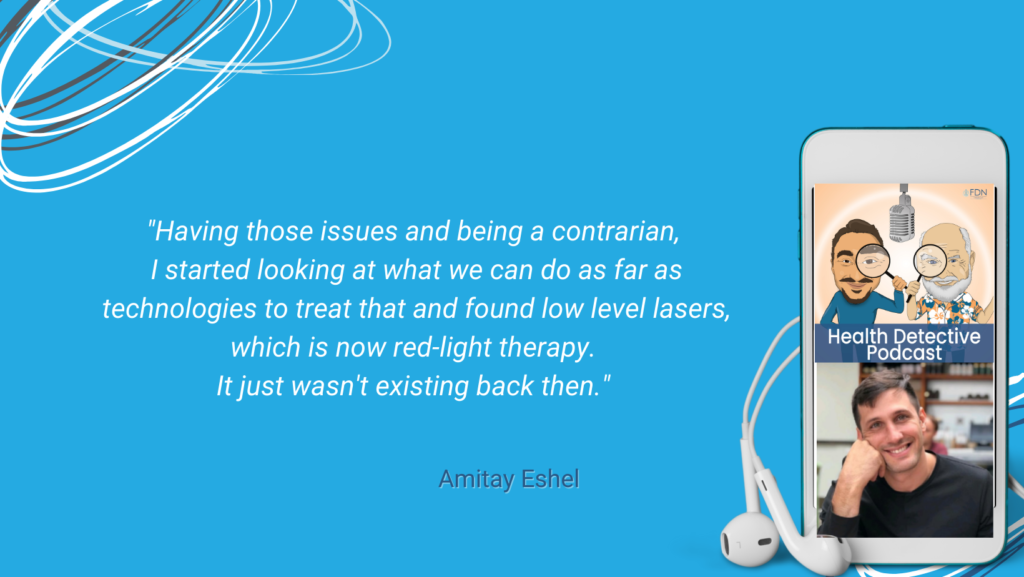
Having those issues and being a contrarian, I started looking at what we can do as far as technologies to treat that and found low level lasers, which is now red-light therapy. It just wasn’t existing back then.
Doing Things Differently
Alongside that, I had a small company that we were advising. We were basically leadership advisors. We were looking at how companies can build teams out of our military experience, how to build teams in the tech industry. We kind of took red-light therapy, what is now red-light therapy, as a project.
Started the company. The company got bought out and we ended up in the United States. Basically, started consulting within the biohacking space. That’s kind of how I got into health optimization, biohacking, whatever you want to call that.
[00:08:33] Detective Ev: Okay, cool. Is this a company that we would know?
[00:08:35] Amitay Eshel: No, it’s now a non-existent entity within some of the major red-light therapy brands. We were innovating in that space when it was very early.
[00:08:46] Detective Ev: That’s interesting. But obviously you’ve stuck around with this. So, is this one of those cases?
Because my girlfriend served in the military in the United States. You know, she joined it. It was awesome. Then it seems like a lot of people get out and it’s like, okay, well what’s next? There’s not always that next plan.
Did you happen to like fall kind of naturally into this space? Were you looking for that “what’s next thing?” and this worked out?
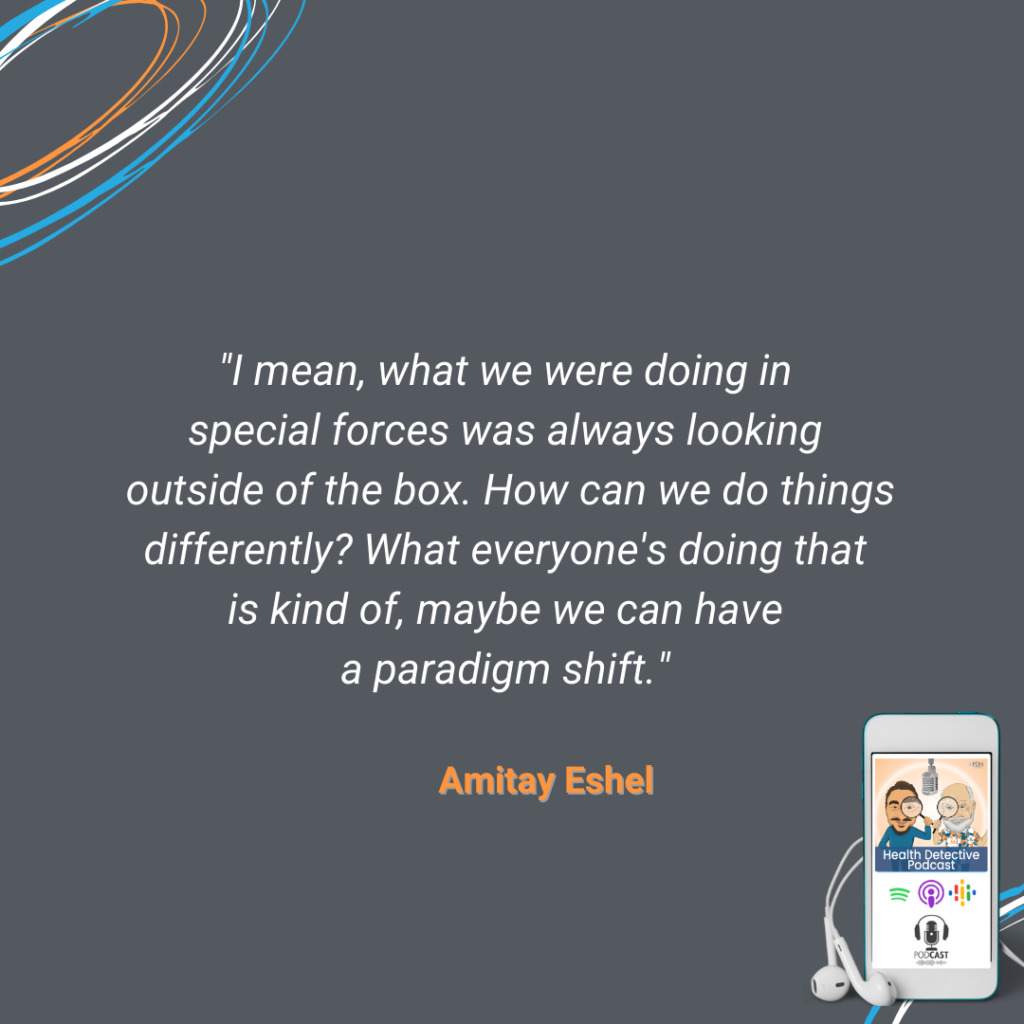
[00:09:07] Amitay Eshel: Well, yeah. I mean, what we were doing in special forces was always looking outside of the box. How can we do things differently? What everyone’s doing that is kind of, maybe we can have a paradigm shift. If we can do that and attack things from a different angle, no pun intended. That’s carried with me throughout my civilian life.
Everything is Habits
Obviously, I understand how important being in peak health is and engaged in high performance you need to be in order to maintain that.
Because what I got out of all of this is everything is habits. You are, whatever you think you are as a person, is just your habits in everything, how you brush your teeth, how you put one foot in front of the other. Every small part of you is a habitual action.
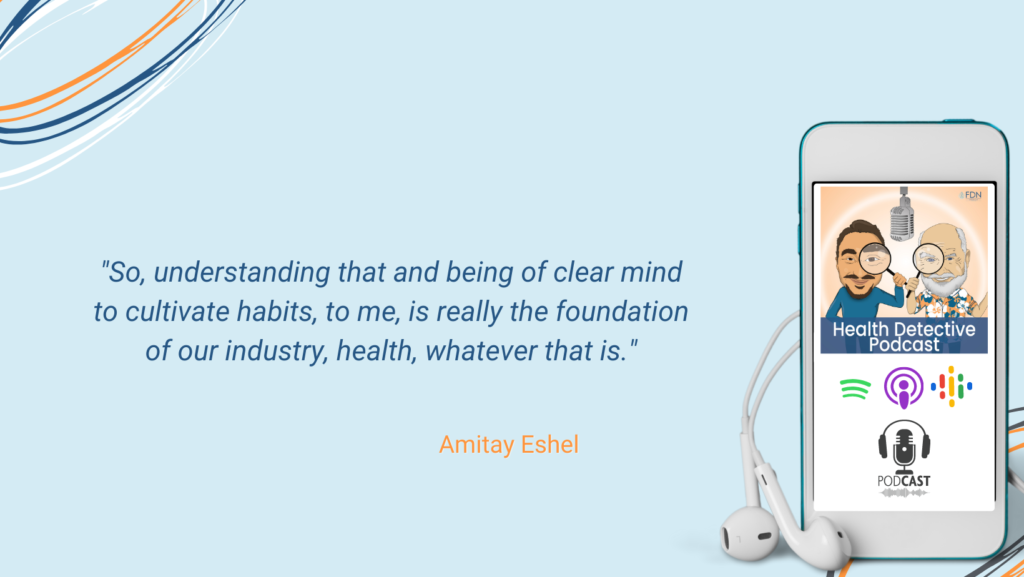
So, understanding that and being of clear mind to cultivate habits, to me, is really the foundation of our industry, health, whatever that is.
[00:10:04] Detective Ev: Gotcha. I’m curious, cause you had these nagging injuries, you’re looking to optimize. And it’s really something I should specify here. Because I would assume that anyone listening to this podcast does know biohacking. But I think sometimes it confuses people because we kind of bleed into both areas.
We started out in what would be more called the integrative or functional medicine space and we’re still there. But now we’ve realized, all right, there’s a lot of room for this in the biohacking space. Because in the functional medicine space, a lot of people come in who are super sick. I mean, sometimes 15 years of autoimmune disease, whatever.
Biohacking, you do see that as well. But you’ll also get these people like yourself, and even myself at this point, that are looking to optimize. I said, I feel okay, but I want to be able to work all the time in today’s world without getting super sick. I want to be able to learn faster. I want to be able to think clearer. And I think it’s a common theme that many people want.
And lo and behold, biohacking’s born, right?
Graduating to Biohacking
Do I think anyone needs to wear blue light glasses at night to be in optimal health. I mean, not necessarily. You could just do some other things. But for people like us, it’s like, well I want the blue light glasses. I could still utilize some type of screen so I could still be learning or working, trying to have the cake and eating it too. I don’t think it’s a perfect situation, but it’s better than not. So that’s kind of the differences for those listening to be clear.
In addition to the red-light therapy though, what else were you using to kind of help optimize? Cause it sounds like you were onto this stuff pretty early. Was there anything else that you really loved using?
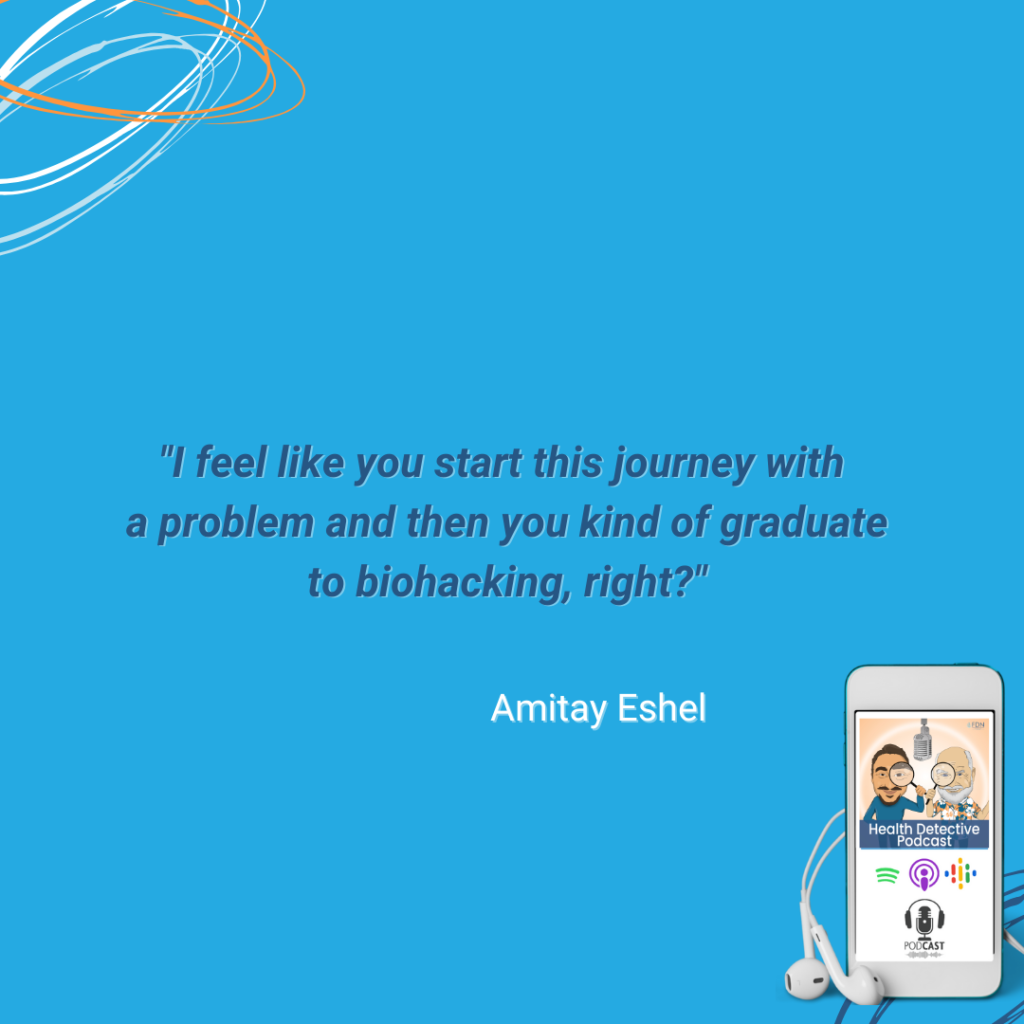
[00:11:25] Amitay Eshel: Yeah, a lot. But first to your point. I feel like you start this journey with a problem and then you kind of graduate to biohacking, right? Like you’re using whatever that is, FDN, or that’s obviously a staple, but any other technology that is imperative for your journey. Then you’re like, that’s a part of what biohacking is now that my health is somewhat better, whatever that looks like. Now I want to get the most out of it.
I agree with you. As far as I’m concerned, I was trying to do everything because I’m that type of person. I’m a binary person. It’s either zero or 100, you know.
Getting into that, I was trying everything, hypoxic training, a hyperbaric chamber, fasting, intermittent fasting a few days, like water fasting. Obviously sleep hygiene in every facet of it, whether it is supplements, whether it is blue blocking, whether it is binaural beats, light and sound therapy, mindfulness, transcranial, direct stimulation, and obviously IVs.
Creating a Product for Your Skin
I was really into NAD IVs. They helped me tremendously with pain, with some brain fog. That’s kind of how Young Goose started because I loved NAD IVs. The idea was to try something consistent that didn’t cost thousands upon thousands a week, which is how much NAD IVs cost, or nad, some people call them, or NAD+.
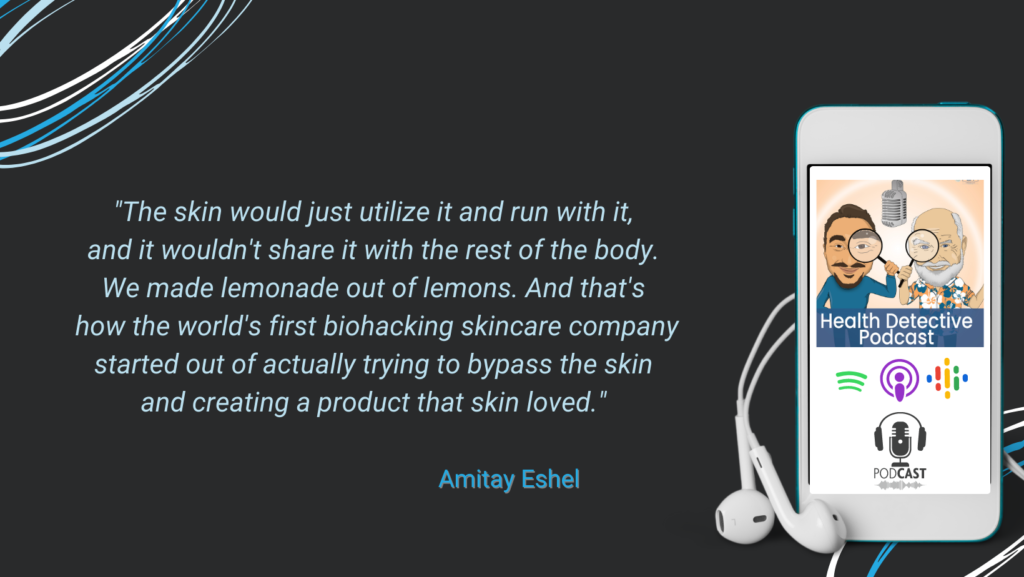
So, we tried to get a transdermal cream to replace NAD IVs. The problem was that the product we developed was really loved by the skin. The skin would just utilize it and run with it, and it wouldn’t share it with the rest of the body. We made lemonade out of lemons. And that’s how the world’s first biohacking skincare company started out of actually trying to bypass the skin and creating a product that skin loved.
[00:13:25] Detective Ev: I definitely didn’t know that that is how this was created. Man, I feel like so many things are pointing me towards doing more IVs because now you mentioned it. Of course, Baldo and Nurse Doza mentioned it the other day with the How Do You Health? thing.
I actually asked him, I’m like, in a perfect world if someone had unlimited money, how often would you do certain things like this? He’s like, I wouldn’t necessarily get the same nutrients every time, but I’d be doing this once a week. He’s like, that’s what I do, and I feel superhuman. I’m like, I want to go superhuman.
Now I hear it from you, and I obviously trust your opinion as well. It sounds like this could be a good thing. That’s so funny that you were literally trying to get this just cheaper at first, not necessarily thinking about the skin stuff.
What Aging is
Then you end up having this like really phenomenal product that’s doing kind of great things. So, I think this is where we segue into that. What is Young Goose? What does this actually do for people and who does it help primarily?
[00:14:10] Amitay Eshel: So, connecting to what FDN does, what we are trying to do is get the skin to function at a younger state or functionally younger, we call it. Which means that we all have the recipe of how our body should function and function optimally in every cell in our body, which is called your DNA.
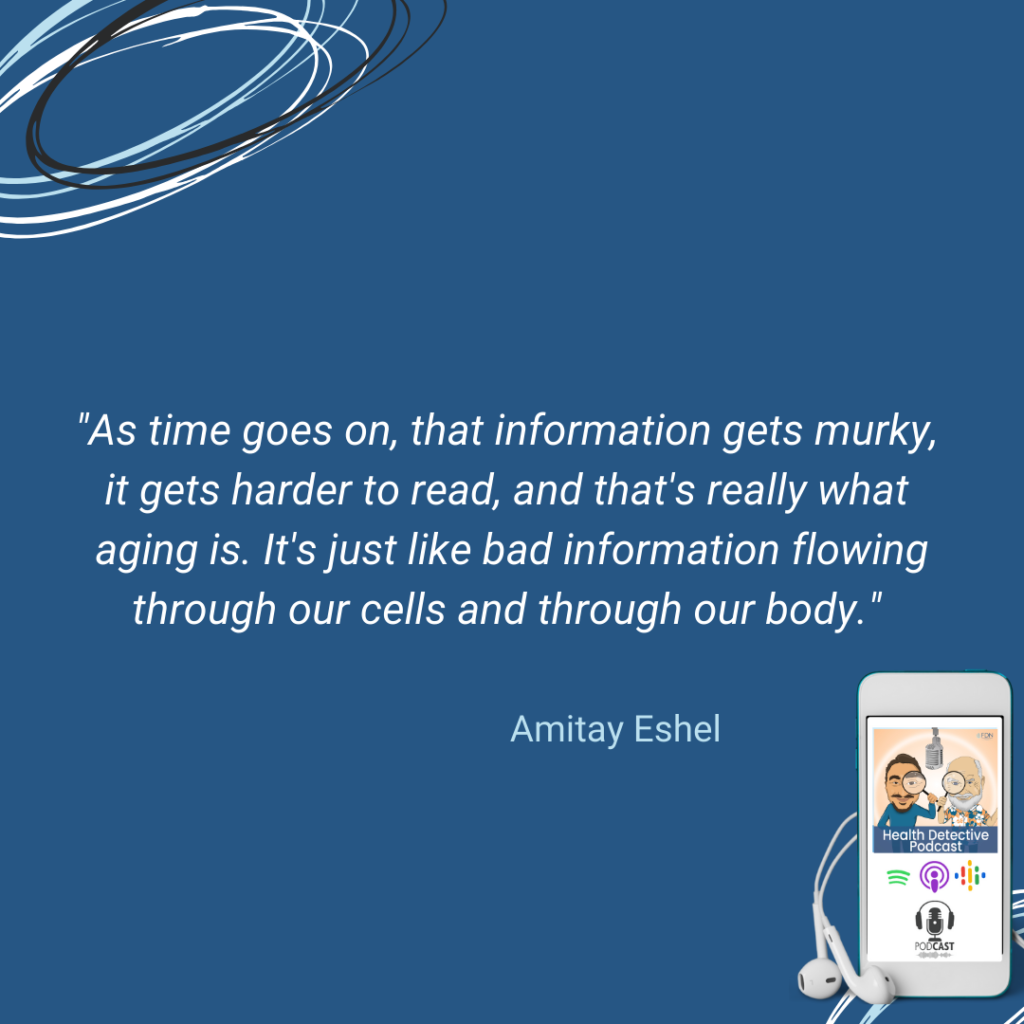
As time goes on, that information gets murky, it gets harder to read, and that’s really what aging is. It’s just like bad information flowing through our cells and through our body. So, by kind of improving that information, we’re fine tuning that engine that your cells have and how they should be functioning.
The problem is, is that if we are looking at the skin, a lot of those things that we are considering signs of aging, the skin does not. So, if you have pigmentation, if you have wrinkles, if you have laxity, as long as the skin is a good buffer and communicator with the body, that’s what the skin is considered youthfulness.
So alone, if we just did that, you are going to get clearer mind. You’re going to get skin that will not age as fast. But if we want to go and rewind what aging looks like in the skin, wrinkle, sagginess, enlarged pores, rosacea, acne, whatever that is, then we need to give the skin specific tasks.
Product for Your Skin Becoming Popular
We have our basic protocol, which is just a couple creams, one for the eyes, one for the face, and they rewind the functional age of the skin. And then our serums are person specific. What do you want to do? What do you want to ask the skin to do? And then that synergy is the way that we create results that made us popular within the biohacking industry, we’re extremely popular.
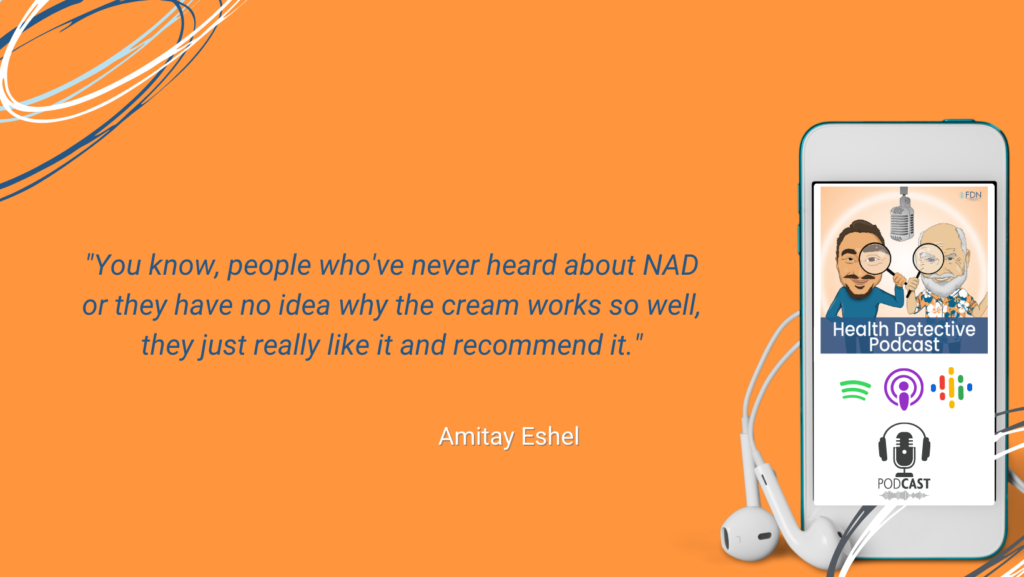
Outside the biohacking industry, people are starting to find out about us. And that’s really fun. You know, people who’ve never heard about NAD or they have no idea why the cream works so well, they just really like it and recommend it. We get messages or something like that from people, like my friend told me it does something. I don’t know about the cells or something, but it works really well. Can I understand why? Things like that.
Commercial Break: Free Course Download
[00:16:14] Detective Ev: Hey there friends. It is Detective Ev popping in here really quick. We just wanted to let you know about a new resource that we have. It is the entire course curriculum. You’re basically able to download the entire thing so that you can quickly and easily see inside what FDN offers, just so that you can know if this is for you or not.
We have a lot of people that listen that are already FDNs. We have many people that listen that are considering FDN based on some of the crazy stories we’re able to share here because of the results that we get with this philosophy. And so, we really like to just make it simple for people.
We hope that you stick around on the podcast regardless. But we know that the course itself is not for everyone, and we want to make this an easy decision for people. This new resource can be found at fdntraining.com/course. That’s fdntraining.com/course.
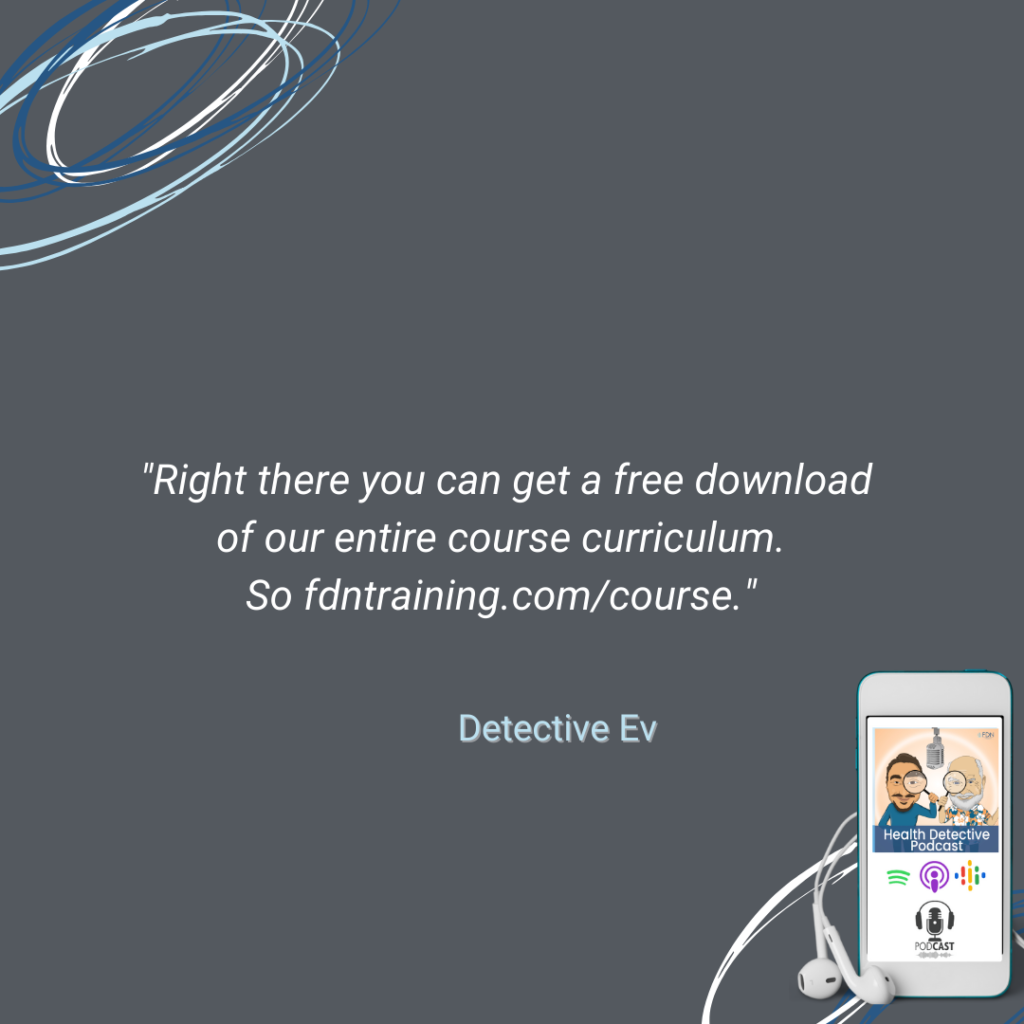
Right there you can get a free download of our entire course curriculum. So fdntraining.com/course.
All right now back to today’s episode.
Having Some Common Sense With This
This is so cool. I don’t think you and I would’ve ever discussed this yet, but one of the things that got me into the space is severe cystic acne. Well, you’re in a skincare company, so maybe you’ve seen a few worst cases. But like the average person probably hasn’t even seen a worst case.
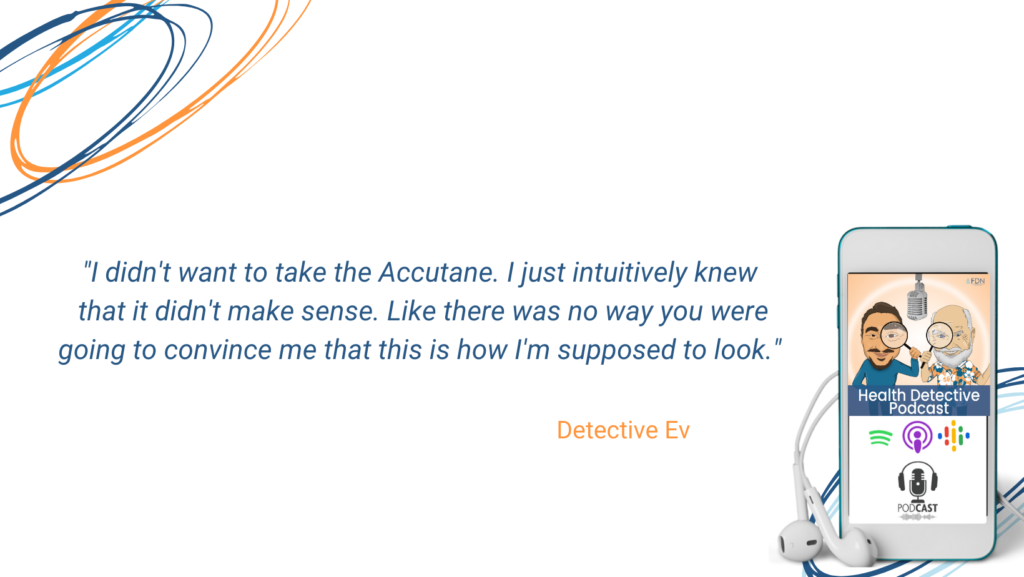
It was terrible to the point where like, you don’t want to leave your house, type of thing. And thank God, it was one of those things that triggered me into this, obviously because I was so humiliated. I didn’t want to take the Accutane. I just intuitively knew that it didn’t make sense. Like there was no way you were going to convince me that this is how I’m supposed to look.
I always recall a time, like I was in science class, and they teach you about natural selection. They’re telling me and all these kids in class at like 16, you guys are the best of the best genes. That’s how you got here today. I’m looking around the classroom.
I see face, for me, full cystic acne. This kid is on an inhaler, that kid is 200 pounds overweight, you know, she’s got diabetes. I’m like, this is the best genes? Like, that’s how we got here? It’s not like I had some science background. But at a certain point you can just have common sense with this.
And I believed that the teacher believed what they were telling me, but it didn’t add up. I’m like, there’s no way that this is the best genes. And so, I’m actually very fascinated by this.
Faster Results for Your Skin if You’re Older
I know that you’re in the biohacking space, so maybe it’s a bit biased right now. But do you find that there’s maybe a specific type of condition that this works better for than not? Like, is this really great for acne? Is it better for rosacea or the scarring? Or does it kind of work for all of them pretty decently?

[00:18:34] Amitay Eshel: Well frankly, the older people are, the faster they see results with their product because there’s more to fix, right? There’s more that’s wrong as far as how the cells function.
But as to your point, the problem is not necessarily the genes, the problem is the communication with them. Okay? So, we live in a very artificial society from the food that we eat, what we’re exposed to, all the way to our emotions and what we need to deal with emotionally on a regular basis. So, everything is really detached, neither good nor bad.
But we need to recognize that it is not what we were exposed to become the creature that we are for the last 2 million years, or if we want to consider it like 5.6 billion years since Earth was born. Our society is a manufactured society. It’s built basically to limit the exposure to any type of natural stressor that we have naturally in the world. Whether it is viruses, whether it is predators, whether it is the climate, the need to hunt and gather food, everything is now artificially provided, artificially buffered. And our bodies or our genes are really designed to be interacting with that type of stimulation.
Distilling Environmental Cues
What I’m trying to get to is like, think of a rabbit changing its color from brown to white in the winter. It does that because nature is interacting with it in a way which triggers that. Trees, changing their colors, bears hibernating, whatever that is. We can look at any animal, and every animal has the ability to adapt to the environment that it grew up in. We have that as well; we just are not exposed to that environment.
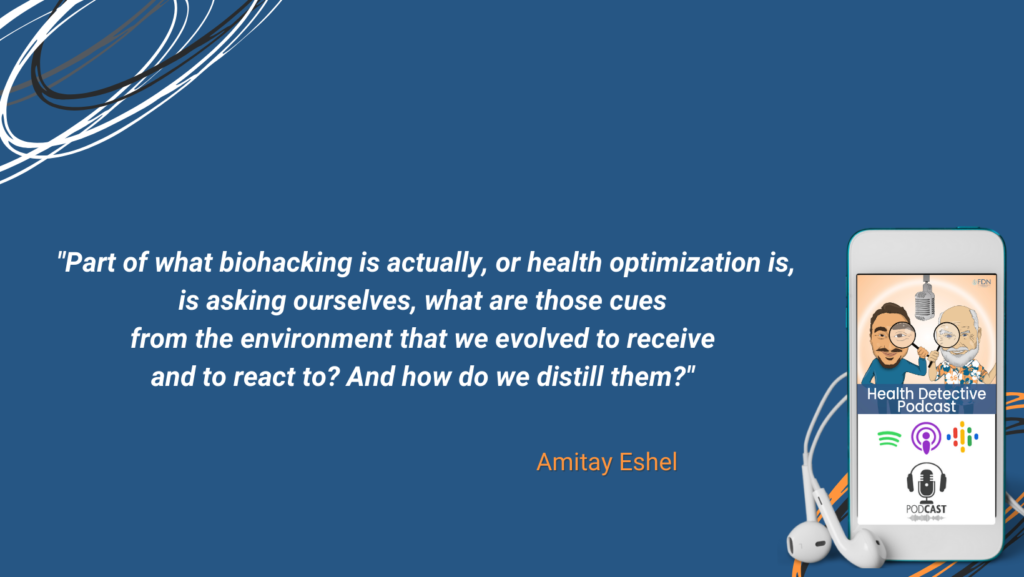
Part of what biohacking is actually, or health optimization is, is asking ourselves, what are those cues from the environment that we evolved to receive and to react to? And how do we distill them? How do we take only the good parts of them and kind of nullifying the bad parts? Because in everything there is a good and bad, right?
The sun, you know, helps us create vitamin D, but it also creates DNA damage, et cetera, et cetera, et cetera. So how can we take the good without the bad? That’s what we’re trying to do as well within skincare. But obviously, as a biohacking company, we have to admit that it’s only a very specific part of a ancestral living-oriented routine or lifestyle that someone needs to have, whether it is food, diet, sleep, whatever that is.
[00:21:25] Detective Ev: I appreciate the transparency. I think that’s actually very needed in this space. Again, as someone who suffered and still gets an occasional breakout, but I don’t look at myself as like suffering with it now. I suffered with it from about age 9 to 21. I mean, it was ridiculous. It was pretty much my entire young adulthood and teenage years until I really got this under control.
Also Address the Lifestyle Stuff for Your Skin
My point is, when you’re in that space, you’re desperate to try anything.
All of these places promise you this will cure it, this will cure it, this will do it. So, I actually appreciate that realistic stance where it’s like, hey, this will help, but if you’re not doing the other stuff, it’s just not going to get you there.

Because a lot of teenagers especially were sold on this idea. Well, I won’t mention any brands, I’ll get sued. But you know, this brand will do it, or this other popular brand will do that. It’s really disappointing then when you get it. Some of them, I mean, they don’t do anything because you haven’t addressed the actual lifestyle stuff.
Now, one thing I am very curious about is when people have dealt with like severe cystic acne. I mean, thankfully, I have the beard nowadays. But like I definitely have some scarring here and probably up here. I would be like; this sounds like a cool product for me if I could get that to go away. I don’t really think about it. But I mean, if I could choose to not have it, why not?
And I’m already in that healthy lifestyle thing. I know many people who eliminate the acne, but the scars are still there because of that. So, if they’re already doing the lifestyle stuff, they’ve gotten away the main problem and now they want to heal.
It sounds like your product could probably. I’m selling myself. I feel like it could be useful for that.
Using Stress that Leads to Positive Results for Your Skin
[00:22:45] Amitay Eshel: Well, you’re right. But I think the only word I’m going to change there is, “heal it”. Because it kind of connects to what I was saying before, our skin has no idea that’s a problem. It’s like, I dealt with it. It’s not posing any threat to my survival.
Obviously, we are not at the point where our body is aware of the fact that it can make us more or less attractive to the other sex. We’re not there yet. But the body’s like, yeah, I’m good. I’ll concentrate my effort in other things. What I’m trying to heuristically point out to, is the fact that our body addresses and heals what inflammation is attached to or what is giving a cue that attention is needed.
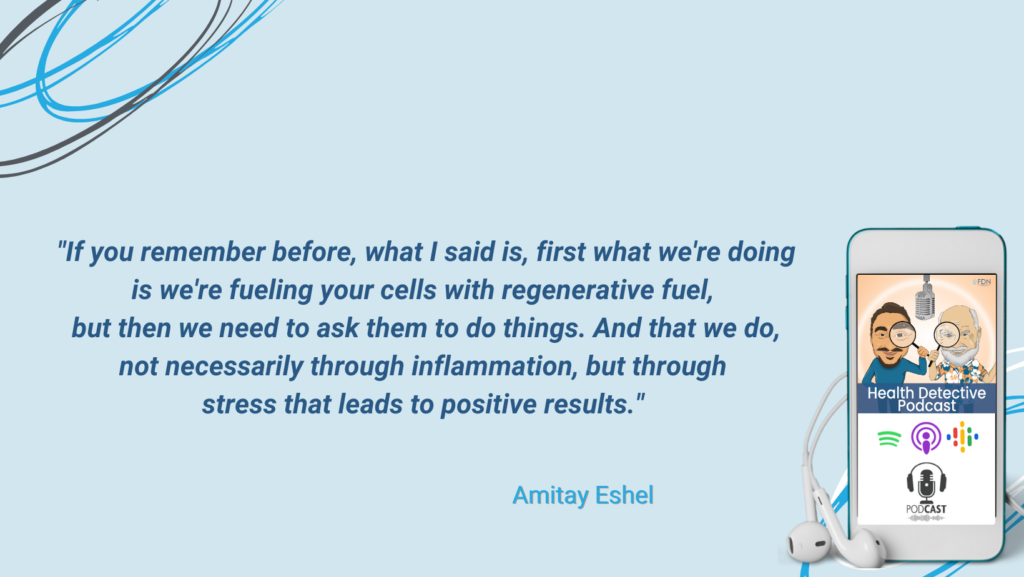
If you remember before, what I said is, first what we’re doing is we’re fueling your cells with regenerative fuel, but then we need to ask them to do things. And that we do, not necessarily through inflammation, but through stress that leads to positive results.
And if someone wants a word for it, the word is called hormesis. So, anything from infrared sauna or any kind of sauna, working out, intermittent fasting, cold plunge, any type of stress that then the body adapts to and creates and builds resilience from is called hormesis for that matter. Kind of what doesn’t kill you, makes you stronger type of thing.
We have hormetic molecules. And our type of retinol is one of them that then have the skin adapt and regenerate in a way that we are asking it to do it. So specifically for scars and things like that, yeah. We have a bio-retinol.
Improving How Your Skin is Functioning
It’s a retinol that is very unique in the way that it only creates the cue for repair without damaging the protective layer of the skin. Doesn’t make you red, irritated, flaky, whatever that is. And we can see incredible results for scarring, acne scarring and for acne as well. That is just to touch on that.
We have another serum that mimics rapamycin and metformin. I don’t know if you guys are talking about it a lot in your podcast, but these two are drugs that are known to be longevity inducing. By mimicking how they work in the skin, we can have, for example, your skin balance out oils much better or detoxify much better.

We have a few products that are not necessarily like you see in some commercial. Oh, they target acne and you’re not going to have acne. No. What we’re doing is we’re improving how your skin is functioning, so it does not develop acne for that matter. But we’re working on a few other really cool things that we’re going to have in the next few years that are even going to improve that.
[00:25:25] Detective Ev: Just for those listening that might not be familiar, because I’m not an expert in it. But the rapamycin and metformin, I’m guessing they’re inhibiting mTOR, right? That’s really the thing. They’re kind of inducing autophagy. Is that the thought process behind it? And that might be oversimplified.
[00:25:38] Amitay Eshel: That is correct.
Zombie Cells in Your Skin
First of all, I really like how Qualia explains it. Qualia, the supplement brand, has a great product for senescent cells, which is called Senolytic. What they say about it is that it is cellular detox. That’s like the best oversimplification I’ve found.
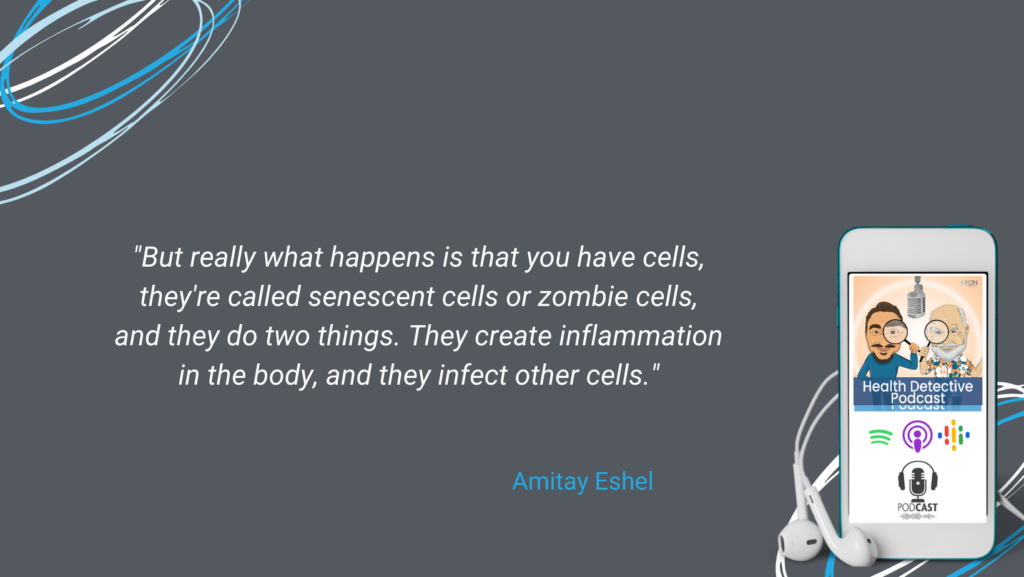
But really what happens is that you have cells, they’re called senescent cells or zombie cells, and they do two things. They create inflammation in the body, and they infect other cells. Aside from that, they don’t do anything, and we accumulate them as we age. That’s kind of a default of the body when it cannot basically kill them off or recycle them.
So, the body defaults to more and more and more as we grow older. The problem is, it’s a real snowball. They just infect other cells. They create more inflammation; they create more problems. They’re the agent provocateur of the body. Wherever we need more renewal or wherever there is more wear and tear, they’re going to be more prevalent.
And guess what organ has the most of them? You guessed right? It’s the skin.
We have a senolytic product that does two things. It does eliminate them, but it also kind of limits the havoc they create. Through that, one of the byproducts of that is like better mitochondrial function, better energy in the cells, which causes your cells also to balance out oils much better.
Because normally oil production in the skin is a byproduct of protective layer that is not hydrated enough, that is not performing very well, or cells that are not performing very well. The body just either over creates or under creates oils in order to try to find another way to kind of balance that out.
Address the Real Problem with Your Skin
But this is a very crude way that creates problems with it, such as acne, such as you know enlarged pores, such as, if it doesn’t create enough oils, it could also cause redness, irritation, psoriasis, eczema, things like that.
[00:27:38] Detective Ev: Well, that’s amazing that this product is actually kind of coming at this in multiple different ways.
Most people don’t realize, I get a lot of people that reach out to me personally just because of the acne story, right? They want to know, what do I do? I don’t want to take Accutane. Is there other alternatives?
The first thing I tell them, I’m like, Guys, you have to realize that Accutane is a chemotherapeutic drug originally. We realized as a side effect, kind of burns out your sebaceous glands in addition to doing a million other not so great things to the body. Really that’s just addressing the symptom. It’s not addressing the real problem there. And it could be a variety of things, right?

In a really simple sense, sometimes people take way too hot of showers. I know for me, when I was a kid, I’d sit in the shower for 40 minutes in the winter. You get out, it’s super cold, and your skin immediately starts like kind of getting a little flaked up. Then as a response, it increases the sebum production because now it’s all dry and it wants it to be at that good level, what it considers a good level. So that’s a really simple way.
Refusing to Explain the Gut-Skin Connection
There’s other conditions like hypothyroidism, could dry out the skin a lot and people could have it as a side effect. What I love about yours is it’s much closer to addressing, if not directly on, actually addressing one of the real problems. Instead of just, let’s take a chemotherapeutic drug and give it to pimple face teens, and yeah, we’ll burn out their sebaceous glands. How on earth did we ever let that get to the market, let alone still be around now? I mean, that’s criminal.
[00:28:57] Amitay Eshel: Well, there are two reasons for that.
In the spirit of not getting sued, I’m not going to mention the university. But I was in a conference that is called Masterclass in Dermatology, which sounds promising, I know. I was giving a talk there about senescent cells and how actually senescent cells affect brain function. But that’s beside the point.
What happened was, I was talking to the head of dermatology at, let’s say the university that is most commonly known with academic excellence in the United States. Very controversial cause a lot of people paid for their kids to go to that university. And I was asking the head of dermatology about skin flora issues and in general, skin protective barrier issues.
I was asking her, you know, a lot of autoimmune and let’s say acne related symptoms are directly driven from bad gut microbiome. She does do consultations; she’s still practicing dermatology. When someone comes to you, the head of dermatology for that prestigious Ivy League University, do you explain the gut-skin connection?
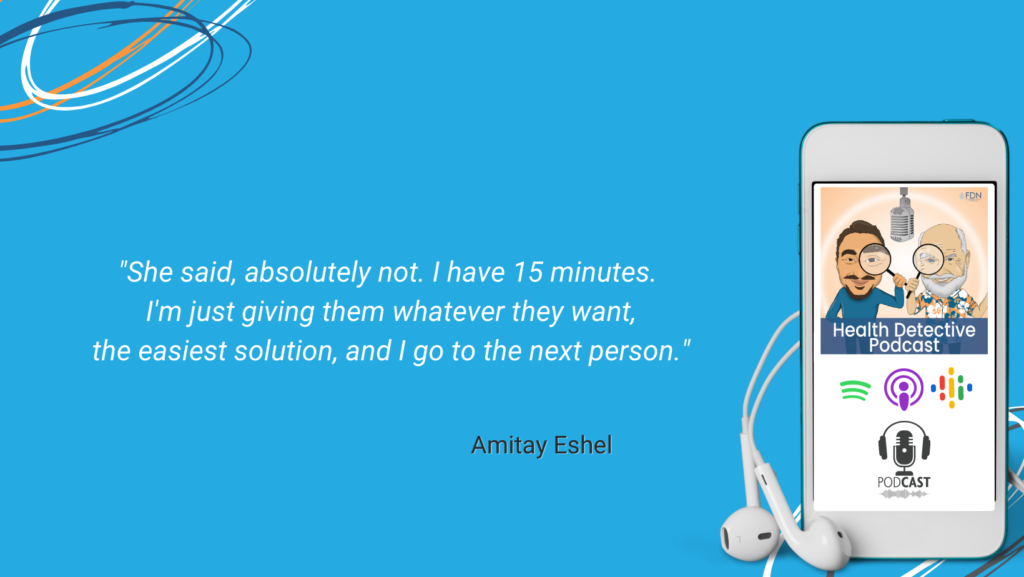
She said, absolutely not. I have 15 minutes. I’m just giving them whatever they want, the easiest solution, and I go to the next person.
Correcting Problems for Your Skin at the Core Cellular Level
The reason I’m telling this story is that we need to understand where we’re at. Like, why are we getting Accutane as a major solution, is because that is the framework of healthcare in the United States, in the world in general, but here it’s very prevalent. So that’s number one.
Number two, our allopathic medicine is really looking at the lowest common denominator, in the most part, in trying to solve that. And the next drug we’re going to take is just going to climb one step up because that missed something that’s more fundamental.
So, let’s say we’re talking about Accutane. Accutane increases the amount of DNA damage we’re going to get from the sun. So, the next step up would be maybe like, I don’t know, God forbid, melanoma. Okay? We’re going to be treating that and we’re going to climb up and up and up. What we are trying to do is to create an upstream solution.

If you think of a stream, whatever you’re dealing with right now could have been solved if you solved that blockage upstream or whatever the poison that’s being spilled upstream. We’re trying to correct problems at their base, at their core cellular level or DNA level. Then obviously everything does improve off of that.
And that’s why I gave you the vague answer before when you asked me, well, do you have things that you do better than others? First of all, yes. Because if you’ve been living with an upstream problem for a long period of time, more things are going wrong.
But in general, because you’re targeting upstream solutions or problems, you are getting that blanket resolution or treatment that addresses most issues that people have in their skin.
Direct-to-consumer Pharmaceutical Advertising Issue
[00:32:11] Detective Ev: Wow. And that’s crazy that that woman said that answer. But I think it also is insightful, right? Because one thing that you mentioned is that she actually said like, you know, you give them what they want.
In our country, people don’t realize this, like direct-to-consumer pharmaceutical advertising is not a thing in most of the world, guys. USA is one of the only countries that does that. I believe the other ones. What is it?
[00:32:33] Amitay Eshel: One of two.
[00:32:36] Detective Ev: Yeah. Yeah. New Zealand’s the other one, correct?
Amitay Eshel: Yeah.
Detective Ev: So, we have two countries in this world out of 200 or whatever it is. Wow, I’m going to mess that up. Do you know how many countries off hand? I always mix it up with how many bones are in the human body.
Amitay Eshel: I think 180 in the UN.
Detective Ev: Gotcha. That’s nuts, right? People don’t realize that it creates a very unique situation in these countries.
I can’t speak for New Zealand. I’m not there. I’ve never been there. But in the United States where people can go in and start asking their doctor for very specific medications for conditions that they might not even be diagnosed with yet, they just believe that they have.
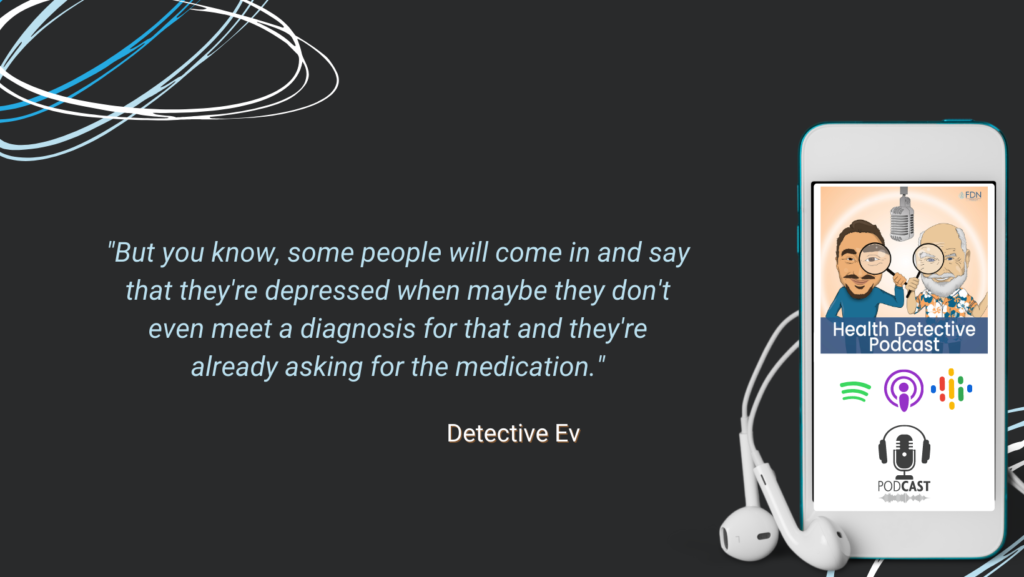
Skin’s a little more obvious, right? It’s pretty clear if I have acne or not acne. But you know, some people will come in and say that they’re depressed when maybe they don’t even meet a diagnosis for that and they’re already asking for the medication.
It’s not just the fault of these doctors. They’re up against a lot. They only have a short amount of time to do this.
Clear Skin Without the Accutane
But it is a shame because I think some of them really are genuinely ignorant to some of that stuff, not perhaps someone in that position.
But I remember all of 9, 10 years ago, going into our family dermatologist, and this is a well-meaning person, right? She’s not some bad evil witch standing behind the desk trying to screw me over. Like, why would she want me to have to take this drug? But in her mind, that really was the real solution.

At some point, I’m going to have to send her my photos, before and after, to show her, hey, I never ended up using that Accutane. I filled the prescription, I was desperate. But I never took one of those pills, not one of them. And it still worked out. Maybe that could be someone to talk to and stuff like that.
I was curious. I always like to hear about like client testimonials. I know this is a little different because this is a product-based thing. And you’re the first to admit that it takes more than just the product.
But I am curious if you have any really interesting success stories about people that came to use your guys’ stuff and it just transformed their skin around and they were super happy. Because I see the before and after pictures at your guys’ booth and those are pretty impressive.
[00:34:24] Amitay Eshel: Yeah. We have a lot of them. And all of them are real users or from clinical trials or whatever that is. But yeah, we just have a lot of them.
Real Users, Extremely Good Results
We have a lot of people who have been using our products for over a year or two years and have started with one product. They can show the difference of using one product for a while. Then, you know, adding another product how that looks like.
But in general, it’s quite tricky to point out in an experiential point of view, what it means to have youthful skin. What our clients normally report aside from having like less wrinkles. or clearer skin, or less enlarged pores is really a sense of skin glow that was missing that they didn’t even know that they’re missing.
Or if the product runs out and they are lazy in ordering some more, you know, a week, two weeks, three weeks pass by, and they feel like they’ve lost that glow that they had. Because again, we’re talking about upstream solutions or upstream problems, it is extremely individual from person to person.
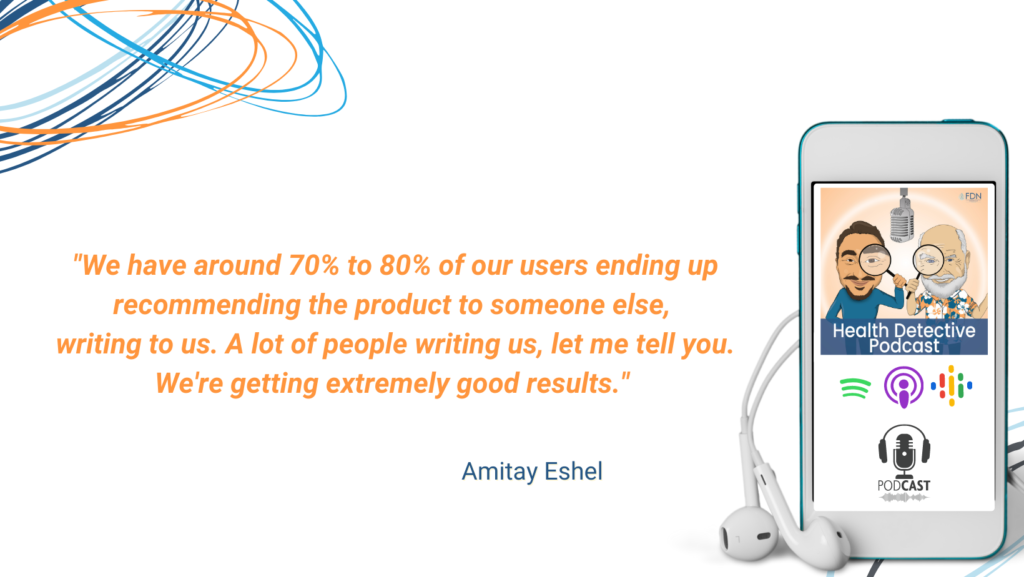
We have around 70% to 80% of our users ending up recommending the product to someone else, writing to us. A lot of people writing us, let me tell you. We’re getting extremely good results. We don’t have a lot of products that we’re making a product for each person, but each person gets the results that they need.
[00:35:55] Detective Ev: That’s awesome. I’m actually kind of pretty excited to try this, not only for myself. But my girlfriend, my business partner, and I, we have a light therapy studio in this area of Pennsylvania. We do red-light therapy, but we also offer UV therapy for vitamin D. It’s pretty wacky. It’s a little different. But I’m wacky and different, so that’s why we started it.
Young Goose’s Hyperbaric Mask for Your Skin
But we get a lot of people that come in for, especially since we’re advertising the red-light the most, they come in for skin issues. They come in for pain. A lot of people are coming in now for seasonal effective disorder.
But I’m wondering totally selfishly for this question, it’s not really for the audience. Would you allow someone to sell this retail? Is that something that your company allows? Like could they buy it?
[00:36:34] Amitay Eshel: Yeah, we have a lot of biohacking facilities or anything like that or like health optimization facilities that are selling our products. We actually have a specific product for red-light therapy.
Again, you mentioned your quirkiness, we’re a quirky company. We like red light therapy. We’re going to play around and see how we can improve it. So, we have a product that we went back to research a bunch of researchers from Germany in the early 2000 up to like the first decade of the two thousands. They showed how a specific form of a specific antioxidant can improve red-light therapy by 200% at least.
So, we really mimicked what they were doing and created a product that does that, that people could use at home, or you can use in clinic. And we do do things like that.

Our number one seller is a mask that is called a hyperbaric mask because it attempts to mimic what hyperbarics do to your skin without needing to be in a hyperbaric chamber, even though they’re also improving the results of hyperbaric oxygen therapy in the skin if you are in hyperbaric chamber.
We’re always pursuing those really cool little niche products that maybe other companies are not bothering to do.
Magnifying Red-light Therapy Results for Your Skin
[00:37:50] Detective Ev: That’s of interest to me, and I think it would be of interest to our audience.
To clarify, when it’s increasing the effectiveness of red-light therapy, could they use it anywhere? Could they use it on their face and that would maybe make the results a little more rapid?
[00:38:03] Amitay Eshel: Yeah. Red-light therapy in general, what happens is, you are working against like a ticking clock as far as the results. The results are mainly from stimulating more energy production and also kind of signaling repair through inflammation, which we’ve spoken about before.
The issue comes with, what else is going on? So, that energy creation creates signals for the body to kind of relax a little bit. You know, you’re creating a lot of energy. Our body, again, is a machine that is designed to survive first, and it doesn’t know that you’re not supposed to flee from a tiger attack tomorrow.
It’s going to conserve the amount of energy it creates. After like three to seven, eight minutes, you’re really almost maxing out the amount of results that you can get. You’re not going to create damage, but the big chunk of the results that you’re getting, like three to eight minutes, depends on how big of a chunk of your body you’re exposing.
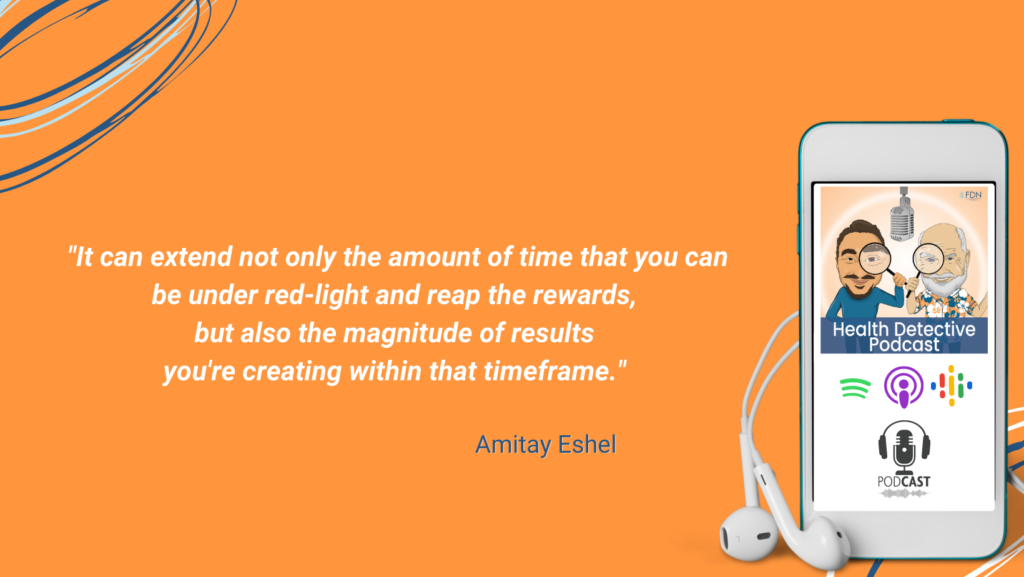
What our product does, it eliminates those free radicals that are created together with that energy creation and the body doesn’t get the same feedback loop of oh, we’re creating too much energy. Let’s stop that stimulation nonsense. It can extend not only the amount of time that you can be under red-light and reap the rewards, but also the magnitude of results you’re creating within that timeframe.
Green Tea Phyto-Serum for Your Skin
[00:39:34] Detective Ev: All right my friend. You might have just created a customer. Because I’m thinking about the people that come in and they’re coming in for the skin stuff. Usually, the people can see a minor benefit even on the first treatment because of course, that’s a very transient effect.

But I tell them, hey, you’re going to need to still keep coming in. But they’re like, wow, they seemed to reduce some inflammation a little bit. I’m like, that makes sense. That can happen, you know. So, when they come in more and more, it gets better and better. I mean, if that can already happen on the first session sometimes, I’m thinking about a product like yours for these people that come in.
Like there’s a young woman coming in tomorrow, and she’s like probably one of our younger clients. She’s a teenager and she has pretty severe acne. She’s looking up to us for everything. I know that we should advocate for this, but she is in that high school phase, right? So, she’s not really willing to look at the diet stuff a hundred percent, even though I tell her that every single time, of course.
To give her something that can maybe work a little more powerfully, I think actually as this works better and better, it’s going to encourage her to listen to us on the dietary end and those other things. So, I like this. We’ll talk off air too, but what is that product called for those listening?
[00:40:32] Amitay Eshel: It’s called Green Tea Phyto-Serum.
Serene Skin: Probiotics for Your Skin
But for that person specifically, even though that would be fantastic for her because it also reduces inflammation, et cetera. And obviously I’m sure you guys are doing red and blue light. That person could probably also benefit from a product. There’s no financial ties there, it’s just something that I highly recommend with those people specifically. A product called Serene Skin by Microbiome Labs.
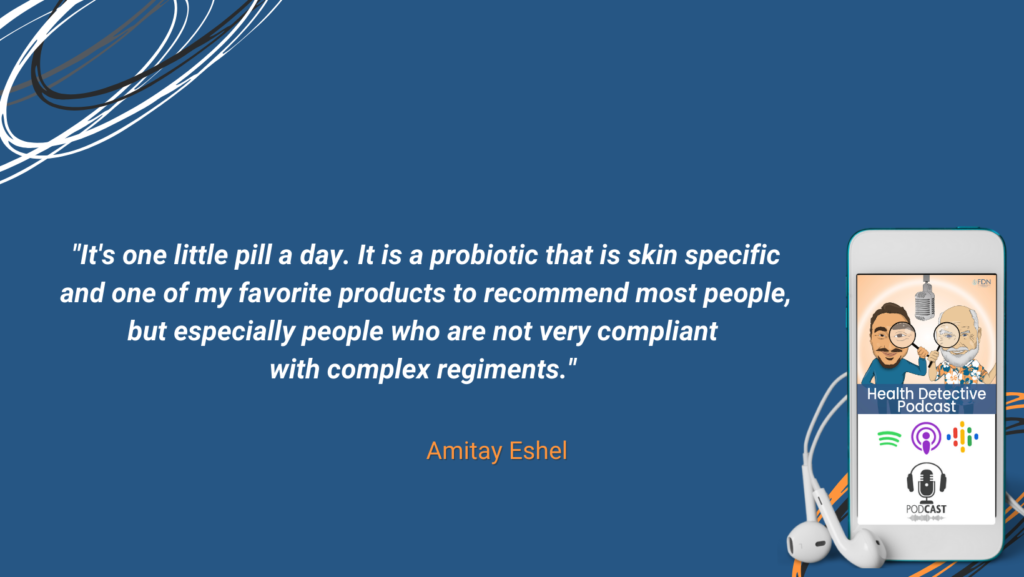
It’s one little pill a day. It is a probiotic that is skin specific and one of my favorite products to recommend most people, but especially people who are not very compliant with complex regiments. That’s like one thing someone can do and really improve dramatically how their skin functions and obviously your treatments together, everything. The more things that she is willing to do, obviously the better she’s going to go.
We need to build habits and we need to do it slowly in a way which doesn’t overwhelm her or someone like her.
[00:41:34] Detective Ev: Thank you for shouting that out. I was aware that that product came out. I mean, I think that’s still within the last year, year and a half. We had Kiran on to talk, but of course we ended up talking about Total Gut Restore and MegaSpore, which is great. But there’s so many products that that company has now.
I had seen that one and it was appealing to me, but I don’t know anyone else who regularly recommends that yet. That’s very encouraging for me to know that you think that that one is worth it for people with the skin side.
[00:41:59] Amitay Eshel: So much so that we, at the biohacking conference, anyone who bought a specific kit from us, we gave them one of those Serene Skins for free.
Where to Find Young Goose for Your Skin
[00:42:10] Detective Ev: All right. Well thank you, my friend. I will try that out. I have an account with them, so now I’m very excited.
Well as we wrap up here last few minutes, the first obvious question that I have to wrap up is where can people find you? Just give us the company name again, website, and then we’ll have it all in the show notes as well, of course.
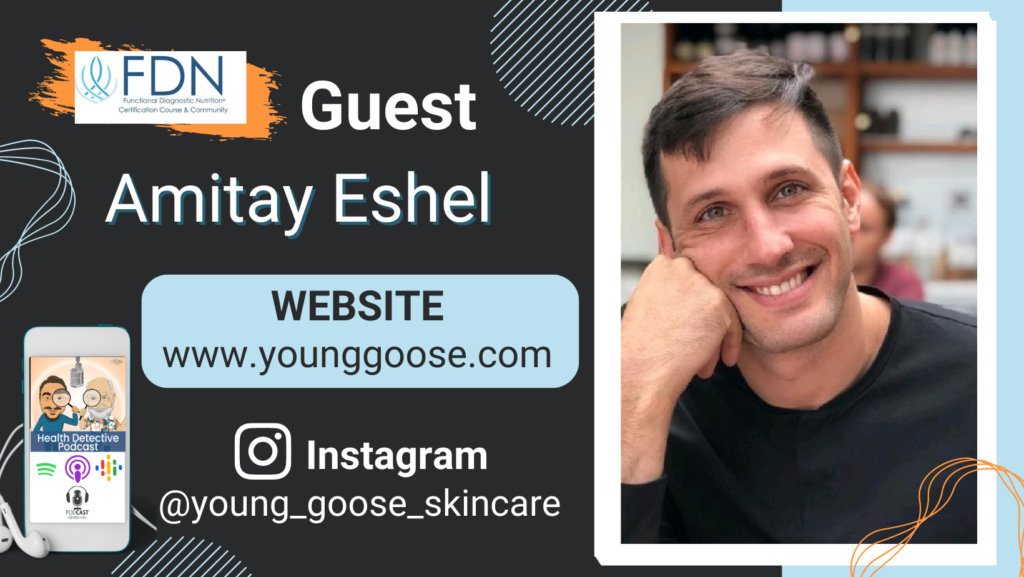
[00:42:26] Amitay Eshel: Yeah. So younggoose.com. The company’s called Young Goose.
Instagram is a great place to kind of follow us and get educated. It’s @young_goose_skincare. And obviously our podcast, Biohacking Beauty, which we didn’t talk a lot about, but it’s kind of the same things I’ve been talking about today. Like what are we doing aside from putting stuff on our skin in order to improve our health and vicariously through that, our skin as well? It’s more of a biohacking, holistic approach to the end result being nice skin. So, half the time we’re not even mentioning the skin.
Health Detective Podcast Signature Question
[00:43:04] Detective Ev: All right, well to finish up today then, I have the signature question for you on this podcast. And I’m very interested to see what this answer will be because you’re such a well-versed guy. You’ve studied so many different things.
The signature question is, if I could give you a magic wand and you could wave it and get every single person in this world to do one thing for their health, so you could choose to get them to actually start one thing or stop one thing, what is the one thing that you would get them to do?
[00:43:28] Amitay Eshel: Mindfulness practice, meditation. Bar none.
I mean, very easy research showing improvement in health and inflammation reduction. I think we have two things that we’re doing in this life. Like we’re taking care of our own happiness in both cases. But the first one is more active and the other one is improving our environment so the environment can then be conducive to better life for us. I’m obviously talking about in a very selfish way, so it would be applicable for everyone.
You know, if I’m the only one that has a good life, everyone around me does not, I’m going to suffer because I’m going to have to live in a castle detached from everyone else.

I think mindfulness practice does both. It improves your health and wellbeing. And if you could spread that around, it’s going to be obviously a huge benefit to the environment, to people around you, to everyone.
Conclusion
[00:44:23] Detective Ev: Excellent. Thank you so much for coming on today, man.
Amitay Eshel: Yes sir.
Detective Ev: Okay, folks. That’ll do it for today’s episode with Amitay Eshel. Really cool guy, right? And what a heck of a transition from very not biohacking skincare stuff to very biohacking skincare stuff. That’s a big career leap. So I thought this was pretty cool for him and the success that he’s had in multiple domains. I really think Young Goose is onto something.
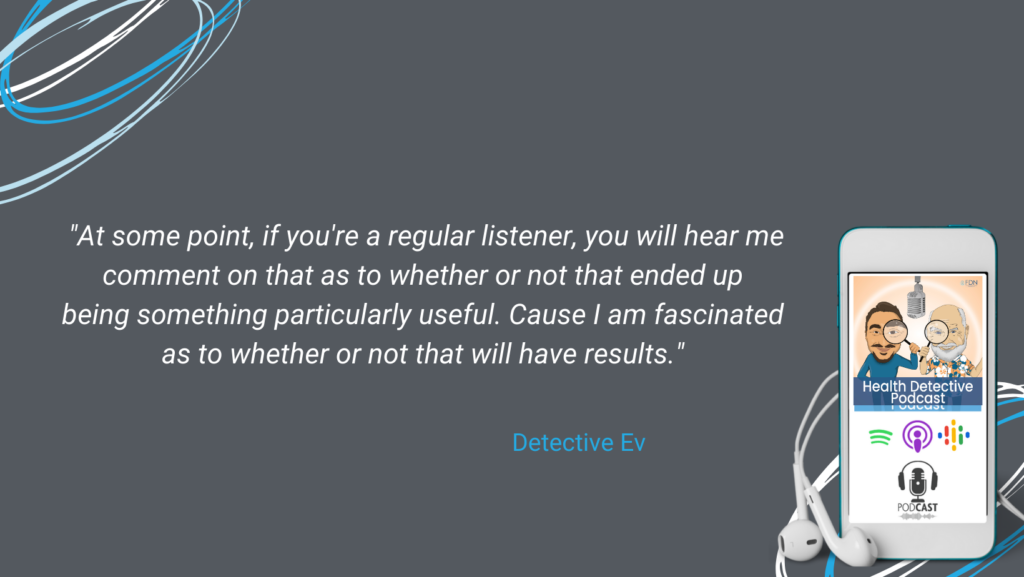
And what interested me most, I don’t know if you guys could tell by the end of the podcast, is I’m like, I want to be able to try some of these things on our clients that I use the red-light therapy with to see if that truly accelerates it. At some point, if you’re a regular listener, you will hear me comment on that as to whether or not that ended up being something particularly useful. Cause I am fascinated as to whether or not that will have results.
I believe Amitay to be clear. But I want to know if it has results that are obvious to the client or myself as the practitioner, as someone who gets to work with people often. So definitely check these guys out if you are interested in keeping your skin as young as possible.
With that said, I am looking forward to talking to you guys again soon and bringing you yet another interview. But until then, please take care.
You can always visit us at functionaldiagnosticnutrition.com.
If you’d like to hire a coach, go to fdnthrive.com.
For a FREE Health Review, go to fdnthrive.com/match/.

